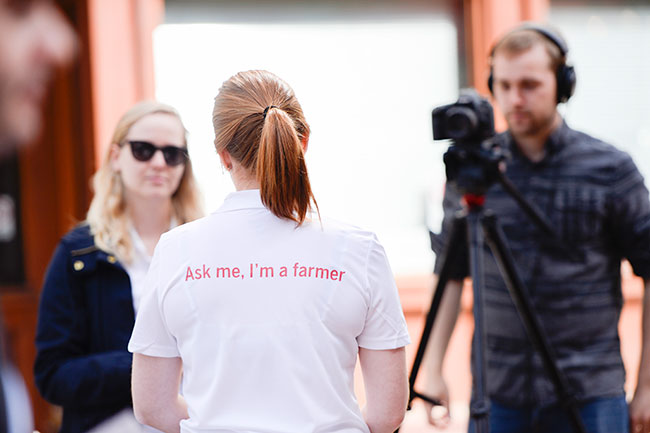
LRIC Update: Advocacy key to advancing innovation
By Lilian Schaer, Livestock Research Innovation Corporation
Features Emerging TrendsBuilding relationships with decision-makers is key.
 Industry advocates work booths at local fairs, present at schools, host open farm days, speak to media and more.
Industry advocates work booths at local fairs, present at schools, host open farm days, speak to media and more. Advocacy is something most farm organizations are undertaking in some way, whether with government, consumers or other stakeholders. It can also be all of the above – or a combination of various target audiences, depending on the issue or the need.
When it comes to successful advocacy – also called lobbying when it involves working with government, or what is now commonly called government relations – by far one of the most important elements is the idea of building relationships with decision-makers.
That doesn’t just mean knowing who to call when there’s a crisis (although that’s helpful!) or only getting in touch to address a need in the sector. Rather, it involves a thoughtful, sustained strategy that helps both sides get to know each other and build a level of trust and mutual respect.
Ontario’s poultry organizations are active advocates, both in speaking to consumers and cultivating and maintaining good government relations. For example, Egg Farmers of Ontario has long hosted an annual breakfast at Queen’s Park for MPPs and government staff, and Chicken Farmers of Ontario (CFO) holds an annual Chicken Day at Queen’s Park to highlight sector issues.
During last fall’s federal election, CFO ran an “I Support Local Chicken Farmers” campaign in various ridings across the province where farmers hosted on-farm tours for candidates. The goal was to help increase understanding about chicken farming and raise awareness of the importance of the sector.
The poultry sector also has long-standing food bank donation programs and regularly steps up with additional support when needed, like during the current COVID-19 pandemic.
“These are all excellent ways to build understanding and help ensure that people know who we are and why we matter when we advocate for support on issues that affect the sector,” says LRIC CEO Mike McMorris.
Advocating for new poultry research facilities in Ontario is one such example. The aging structures currently being used by the University of Guelph at its research station in Arkell need to be replaced. Facilities need to reflect technological and management advances in the sector, as well as accommodate new areas of research critical to the future success of poultry production, like automation, animal welfare and disease control and prevention.
“Good research is critical to be able to back up a specific position with facts and inform decision-making,” McMorris says. “Strong, local research infrastructure is a key component to support this kind of work.”
Another key element of successful advocacy is support from others along the supply chain. This includes building relationships with researchers, feed and animal health sectors, processors and even retail.
It’s important to hear other perspectives on key issues that matter to the sector, and sometimes there may need to be a bit of give and take to find a common “middle ground” that everyone can agree on or support.
According to McMorris, that’s where an organization like LRIC can play an important role. Due to its connections across the livestock and poultry sector and its supply chains, LRIC can identify areas of common interest and bring partners to the table to address cross-sectoral issues.
“Our key goal is driving innovation in the livestock and poultry sectors and one of the ways to do that is to be able to connect people, businesses and organizations who are facing a common problem or trying to solve a similar issue,” he says.
Livestock Research Innovation Corporation (LRIC) fosters research collaboration and drives innovation in the livestock and poultry industry. Visit www.livestockresearch.ca or follow @LivestockInnov on Twitter.
Print this page